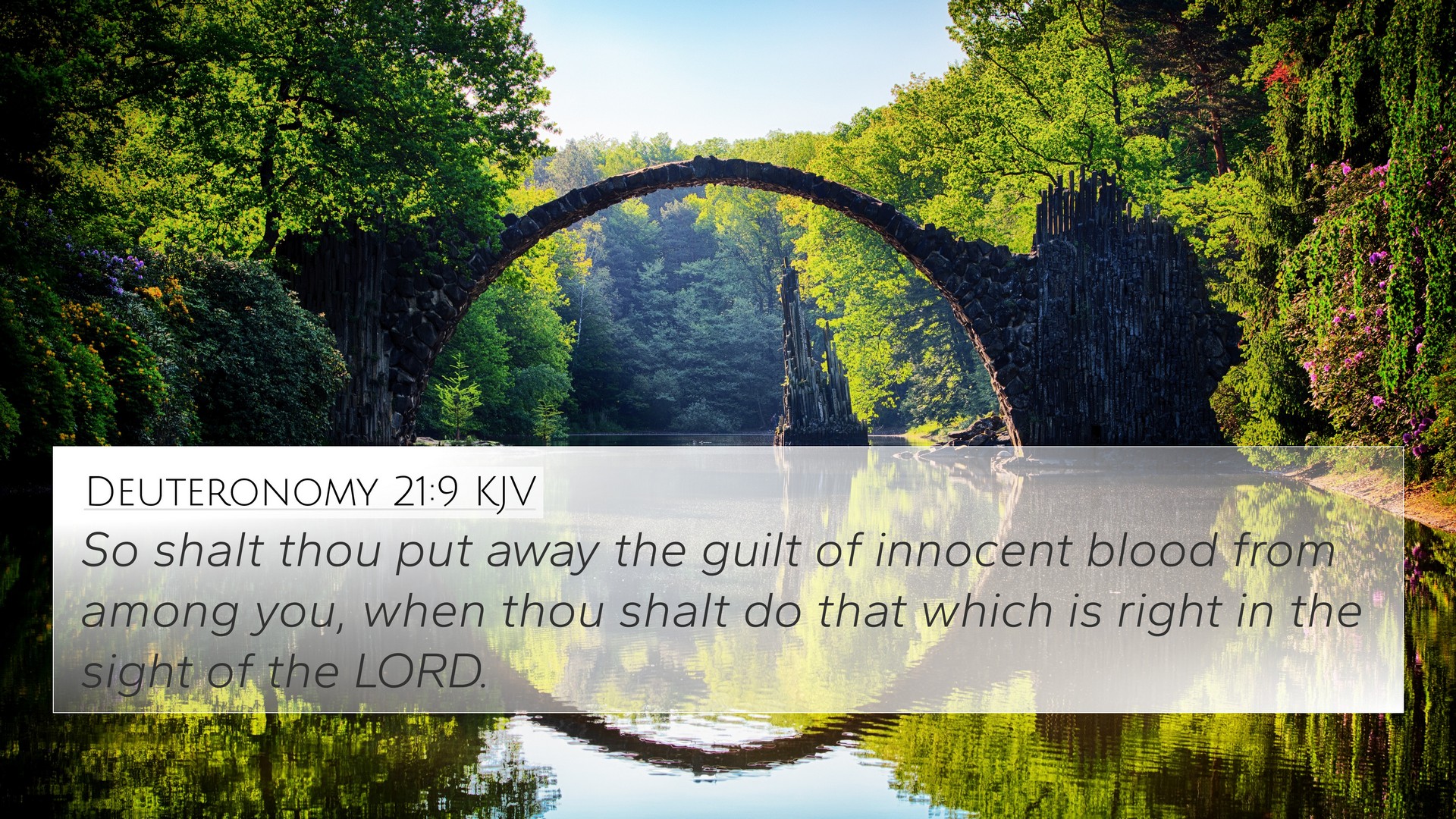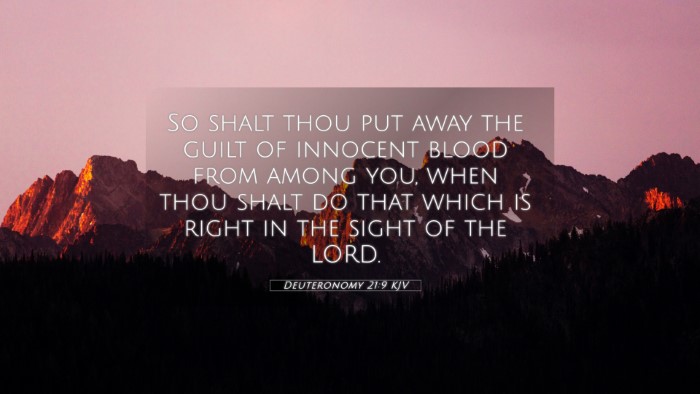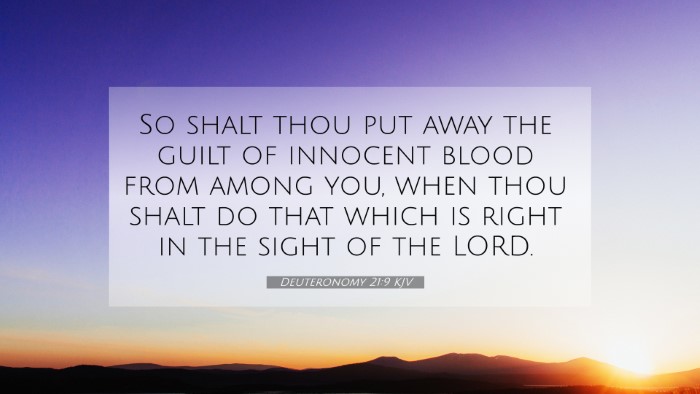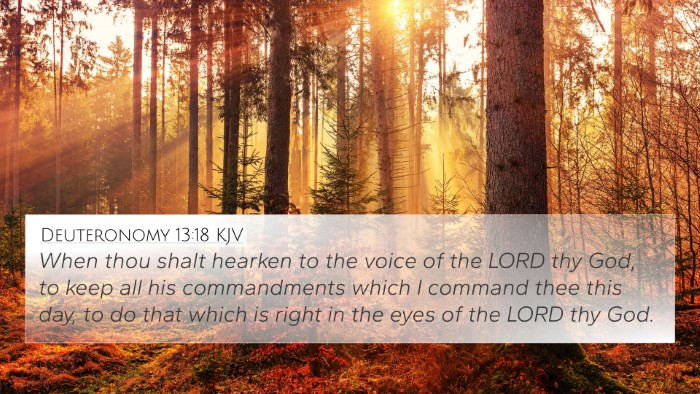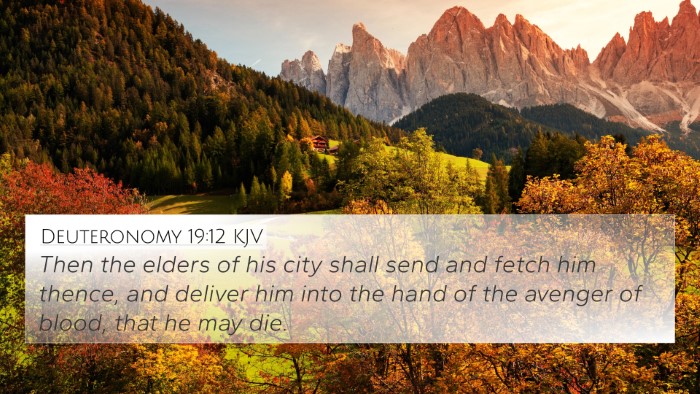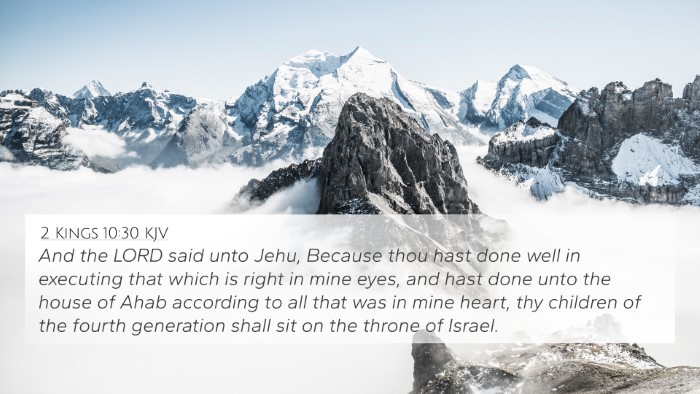Understanding Deuteronomy 21:9
Verse: "So shalt thou put away the guilt of innocent blood from among you, when thou shalt do that which is right in the sight of the Lord."
Summary of Meaning
The verse in Deuteronomy 21:9 instructs the Israelites on how to deal with situations involving unsolved murders in their territory. The focus is on the communal responsibility to ensure justice and righteousness. By following the prescribed rituals, the community can absolve itself of the guilt associated with innocent bloodshed, demonstrating the heavy importance placed on life and justice in the Israelite society.
Commentary Insights
- Matthew Henry: Henry emphasizes the collective responsibility of the community in addressing the guilt of innocent blood. He discusses how this law served to keep the nation pure and innocent before God, highlighting the serious consequences of unresolved murder.
- Albert Barnes: Barnes elaborates on the various ceremonies and procedures that would be conducted, pointing out that these were intended to not only bring about justice but also to foster a sense of moral accountability among the people. The act of performing these rituals acts as a deterrent to violence and promotes social order.
- Adam Clarke: Clarke points out the procedural aspects of the law and suggests that the act of declaring innocence or guilt concerning bloodshed is a powerful statement of morality. He relates this to broader themes of atonement and collective guilt in the Israelite tradition, establishing that the community must act justly to be right with God.
Bible Verse Cross-References
- Exodus 23:7: "Keep thee far from a false matter; and the innocent and righteous slay thou not: for I will not justify the wicked." - This verse emphasizes the importance of justice.
- Numbers 35:33-34: "So ye shall not pollute the land wherein ye are: for blood it defileth the land: and the land cannot be cleansed of the blood that is shed therein, but by the blood of him that shed it." - Illustrates the gravity of bloodshed and communal responsibility.
- Deuteronomy 19:10: "That innocent blood be not shed in thy land, which the Lord thy God giveth thee for an inheritance, and so blood be upon thee." - Reinforces the idea of protecting innocent life.
- Jeremiah 26:15: "But know ye for certain, that if ye put me to death, ye shall surely bring innocent blood upon yourselves, and upon this city, and upon the inhabitants thereof." - Connects to the theme of accountability for innocent blood.
- Matthew 23:35: "That upon you may come all the righteous blood shed upon the earth, from the blood of righteous Abel unto the blood of Zacharias son of Barachias, whom ye slew between the temple and the altar." - Christ's reference to bloodshed and accountability in the New Testament.
- Acts 20:26: "Wherefore I take you to record this day, that I am pure from the blood of all men." - Highlights personal accountability for one’s actions concerning others’ lives.
- 1 John 3:15: "Whosoever hateth his brother is a murderer: and ye know that no murderer hath eternal life abiding in him." - Extends the concept of accountability to sin and intention towards others.
Thematic Connections
Deuteronomy 21:9 can be seen as part of a larger theme in the Bible regarding justice, accountability, and the sanctity of life. The communal aspect addressed in this verse mirrors similar themes in both the Old and New Testaments.
Collective Responsibility
This verse emphasizes that the community is responsible for addressing crimes and ensuring justice. This principle resonates throughout various books of the Bible, illustrating the interconnectedness of scripture regarding justice.
Moral Purity
The call to put away the guilt of innocent blood signifies a broader demand for moral purity among God's people. Such themes are echoed in the teachings of Jesus, who highlighted love and righteousness.
Inter-Biblical Dialogue
Connecting the Old Testament laws to New Testament interpretations demonstrates a continuous dialogue about justice and righteousness. The way different authors across the scripture relate to the concepts found in Deuteronomy highlights a consistent divine ethos.
Conclusion
Deuteronomy 21:9 serves as a vital reminder of the importance of justice and the grave consequences of bloodshed in community life. Through various commentaries, we see how this verse is deeply rooted in the principles of morality, accountability, and the sanctity of life.
